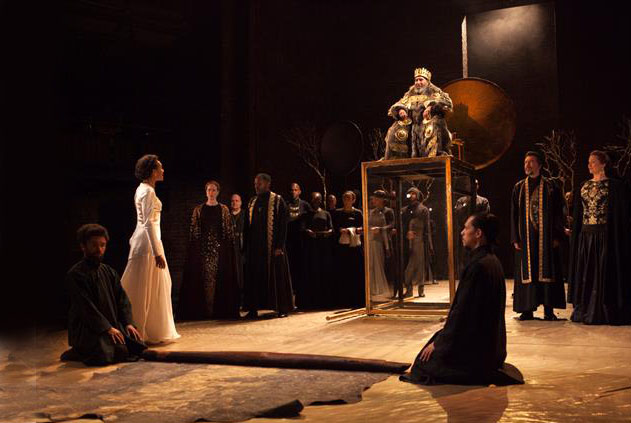
Why do theatre audiences voluntarily submit to this play, to lacerating their emotions with grief and cruelty, to seemingly consenting to the belief that all hope is misplaced, all dreams of human perfectibility an illusion?
All I can answer is Gregory Doran’s production conceived with his Lear, Antony Sher, leaves you emotionally drained but vitally alive. Full of the questions about the human mind that only Shakespeare can inspire: although a lifetime of Hamlets and Lears will only take you through the foothills of understanding.
Clarity can be used as a term of faint praise, but it is Doran’s directorial masterstroke. The story flows aided by devices that speed the action, and an overall concept that explains many of the human predicaments. And Niki Turner’s simple designs empathetically frame every happening.
The long plot, readily available at a website click, begins as the fairy tale story of the octogenarian king of ancient Britain. Abdicating, he foolishly divides his kingdom between his two married daughters, but disinherits his favourite Cordelia who – unlike her sisters – refuses to flatter him with public declarations of love.
Sher’s Lear is an arrogant power-force in a stark, fearful world of pagan gods. A semi-deity, first seen on high enveloped in gold embossed furs, lifted on a spectacular glass sedan chair. His fall to insignificance and raging impotence, leavened with self-knowledge and identification with mass humanity, is all the more telling.
‘I blame the parent!’ is Doran’s approach, as he presents initially sympathetic aspects of the ugly (judged by their deeds) sisters Goneril and Regan, telling played by Nia Gwynne and Kelly Williams. Goneril feeds the poor – who are always with us in this production. Whilst Lear’s brutish gang of knights lodging with him at his daughters’ homes, would provoke a saint.
But Doran’s forbearance has limits, for saint-like they are not. Shaped by Lear’s neglect perhaps, but also their own twisted invention, they tip the old man over the edge into madness, and compete murderously for the favours of Edmund, the illegitimate son of the king’s loyal subject York, who betrays both his father and brother.
Lear is Sher’s crowning achievement, a seamless mix of super-intellect in decline and emotion. Ever quick to anger, his curse on Goneril chills the blood, whilst his meeting with the cruelly blinded York – ruggedly but feelingly played by David Troughton, opens depths of feeling beyond words.
Lear is adored by all the play’s moral characters, albeit that love contorted can turn bad. As Cordelia, Natalie Simpson radiates innocence. Graham Turner makes a northern comic of The Fool to the knights’ approval, and earns our sympathy for his honest, fond accord with the king.
As York’s faithful disguised son, Oliver Johnstone suggests nobility, complexity and suffering. In contrast Paapa Essiedu as his brother charms with the boldness of open depravity.
There’s closing retribution of a sort, with all the wicked characters dead, but also tragically Lear and Cordelia. Edgar is still standing, but hollowed by experience. Bleakness prevails and, moved beyond measure, we should go home and resist the next production. That we cannot, that we must try to understand more, is the play’s eternal fascination. ★★★★★ Derek Briggs 16th September 2016

